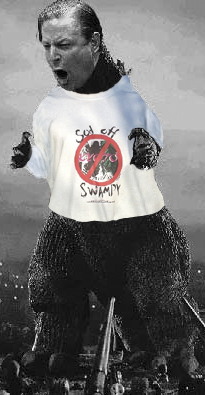So Much For the Protectors of Democracy
No room at the inn for you, bubba.
Taiwan has accused Washington of snubbing Chen Shui-bian, the island’s president, after he was refused more than a brief stopover en route to and from a visit to South America.
A Taiwanese official said on Wednesday Taiwan’s president had decided to cancel his stop in the US and fly by another route.
…Washington has previously refused official visits to avoid offending China, which claims sovereignty.
This time, however, Washington did not allow him even to stay overnight, representing the least prestigious treatment of a Taiwanese leader on an American visit for more than a decade.
Washington appears to be trying to balance its delicate ties with China and Taiwan, and to avoidupsetting Beijing when it needs China’s co-operation in global security matters.
How soon ’til we just hand them on over in a deal to straighten out the yuan or Iran?

“needs China’s co-operation in global security matters.”
We may need it, but we are never going to get it, so let’s take every opportunity to tell them to kiss off.
You can imagine the reaction to this in my household this morning.
Our refusal to recognize the fact of Taiwanese independence, especially now that they are largely a well-governed nation, is nothing short of shameful.
Mike- to be fair, the GMD itself does not recognize Taiwan’s independence. There are still a lot of old GMD soldiers who cherish the fiction of being the “real” government of China. The native Taiwanese are not so wedded to the idea, since they were governed by Japan during most of the Civil War, and many of the older ones look more favorably on the Japanese occupation than the GMD occupation (martial law in Taiwan was not lifted until 1987). February 28 still rankles.
Maybe, one day, the Communist regime wil topplem and the GMD’s wish will come true, and they will start wishing for the old days of de facto Taiwanese independence. China is a pit of quicksand, and time and money spent by foreigners (including Taiwanese) there seldom does any good.
Eeek, you know you’re in trouble when the Japanese come out on top. And that’s a GREAT page, John!
(Mike, email me ~ I had a juicy rumor to spread and your email kicked back…)
Well, the Japanese actually built power stations, dams, roads, and schools, which the Qing were disinclined to do. Most of the institutions of higher education, and one of the main tourist attractions were built by the Japanese, not the Qing. And so Taiwan missed being part of the Nationalist overthrow of the Qing, and the first they saw of the GMD in 1945 were its troops stealing anything they could find, down to the copper sewer pipes sent by the UN hygiene efforts, to send back to the Mainland. Only to have them come running back with everything they could carry in 1949. And then the GMD tries to force liguistic hegemony by fining schoolkids real money if they speak anything but Mandarin in school, when most of the old folks only speak Fujianese and Japanese. Small wonder the Fujianese-speaking Taiwanese population did not look too favorably on the GMD.
“Maybe, one day, the Communist regime wil topplem and the GMD’s wish will come true, and they will start wishing for the old days of de facto Taiwanese independence.”
It’s a nice thought/daydream in its own way, isn’t it? I mean, all it makes me think of is how prevalent in my experience the ROC flag is in US chinatowns. I don’t ever remember seeing the PRC’s in Boston’s, and any portraits are always Sun Yat-Sen, not Mao. Of course, in the purest level of abstract de jure legal theory, despite the fact that almost everyone in the world recognizes the Communists, the ROC really WAS, and therefore still is, the last legitimate government of China…isn’t that right, John?
One cannot help but be reminded of the governments-in-exile during the Cold War of Eastern European countries that had been occupied by the Soviets, especially the Baltics and Poland. If I recall correctly, they were in continuous existence until they handed over formal legitimate authority to the new democratic regimes after 1989.